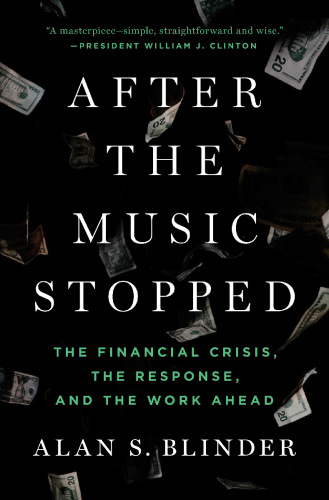
After the Music Stopped
The Financial Crisis, the Response, and the Work Ahead
کتاب های مرتبط
- اطلاعات
- نقد و بررسی
- دیدگاه کاربران
نقد و بررسی

February 4, 2013
As the U.S. economy desperately tries to crawl out of its gloomy cave, many still feel the impact of the 2007 financial crisis. Here, noted analyst Blinder (The Quiet Revolution) provides insights on why it happened, covering three critical questions: How did we get into this mess? What was done to correct problems? and have we learned anything? He opens by addressing the rise of unemployment rates and the housing market crash, with Blinder explaining what happened to big players like AIG, Merrill Lynch, and WaMu as they collapsed. He provides a clear critical analysis of the actions authorities proposed to prevent large corporations from crumbling, and offers his own opinion on how to fix the system. Later chapters explain the key weaknesses that predate the fateful summer of 2007, and what happened to the citizens, why the government took the actions it did, and why those policies were wise. As Blinder outlines the causes of the financial crisis, he acknowledges that questions still linger in the public mind: Has history taught us anything, or are we headed for a repeat of this kind of crisis? Agent: John Brockman, Brockman Inc.

December 15, 2012
An experienced economist explains the global financial crisis that began in 2008 and continues. Blinder (Economics and Public Affairs/Princeton Univ.) has accumulated real-world experience in the political realm of finance as vice chairman of the Federal Reserve board of governors and on President Bill Clinton's Council of Economic Advisers. Noting that numerous books have already chronicled the origins and impacts of the crisis, Blinder suggests that his is unique for a few reasons: It is the most comprehensive so far, is less of a whodunit and more of a "why did they do it," emphasizes public policymaking over arcane financial dealings and looks to the future. After explaining the genesis of the crisis, Blinder analyzes the responses by policymakers. In the United States, the policymaking yielded a paradox: financial markets left to police themselves after ill-advised, ideologically based government deregulation needed previously unwelcome intervention to avert complete calamity. But then public opinion seemed to view the federal government as villainous. Blinder does not portray government decision-makers as heroic, but he demonstrates that without their energetic intervention, far more institutions would have collapsed, more homes would have been foreclosed on, and more jobs would have been eliminated. Throughout the book, the author explains nuances unexamined or underexamined in the large number of previous books appearing since 2008. A clearheaded analysis with a final section suggesting that lessons learned from the crisis are already being ignored.
COPYRIGHT(2012) Kirkus Reviews, ALL RIGHTS RESERVED.

August 1, 2012
A former vice chair of the Federal Reserve's Board of Governors argues that the United States created the worldwide economic downturn by pushing unreliable investment products abroad and that without government intervention the situation would have been worse. Then he tells us what we really want to know: what happens next.
Copyright 2012 Library Journal, LLC Used with permission.

March 1, 2013
Blinder, a corporate executive and former vice chairman of the Federal Reserve, sets out to tell the American people what happened during the financial crisis of 200709. He explains the events that are still reverberating in the U.S. and globally and will challenge public policy for years. With public policy as his focus, he considers how we got into that mess and how we got outto the extent we have gotten out. The author considers the futurewhat have we learned both economically and politically, and will we handle future crises better? What vulnerabilities do we still have? What future problems have we accidently created? Finally, Blinder offers a host of recommendations, which include his Ten Financial Commandments, including Thou Shalt Remember That People Forget (people forget when the good times roll) and Thou Shalt Not Rely on Self-Regulation (Self-regulation in financial markets is an oxymoron). This excellent book in understandable language offers valuable insight and important ideas for a wide range of library patrons.(Reprinted with permission of Booklist, copyright 2013, American Library Association.)

























دیدگاه کاربران